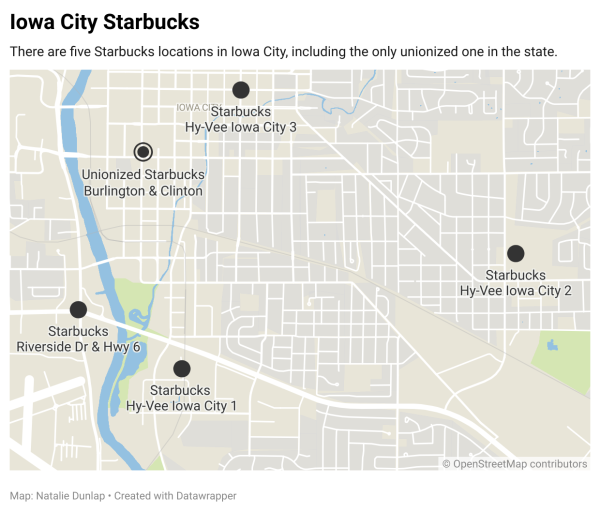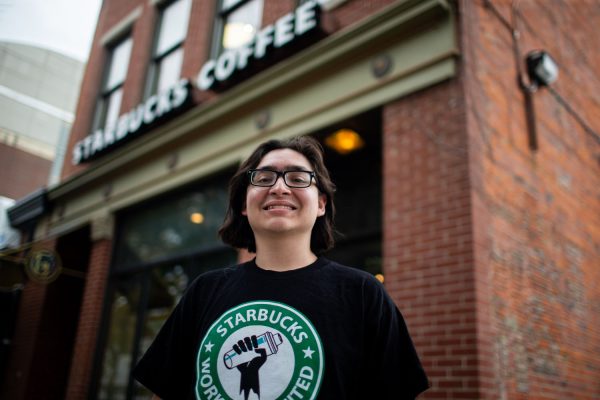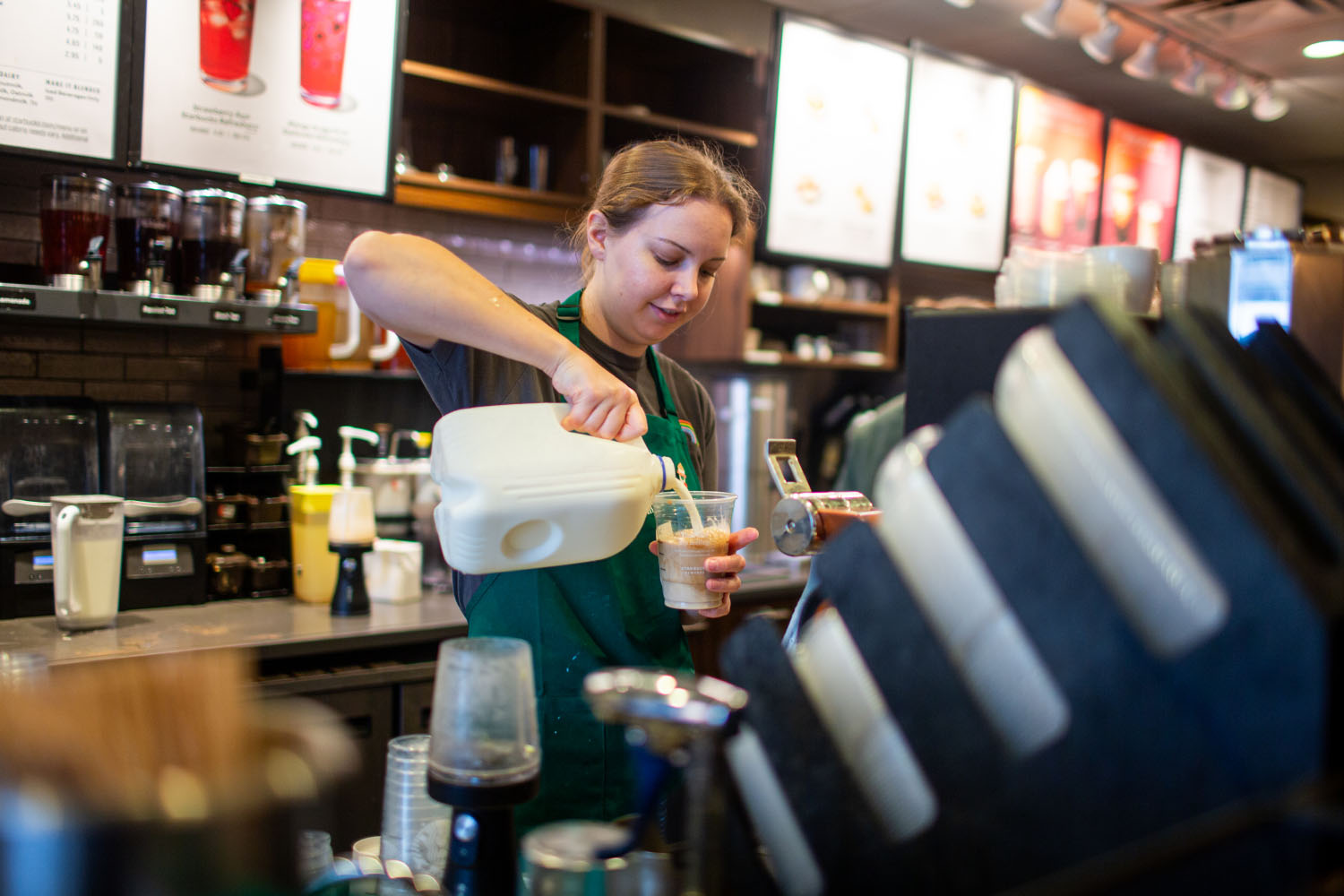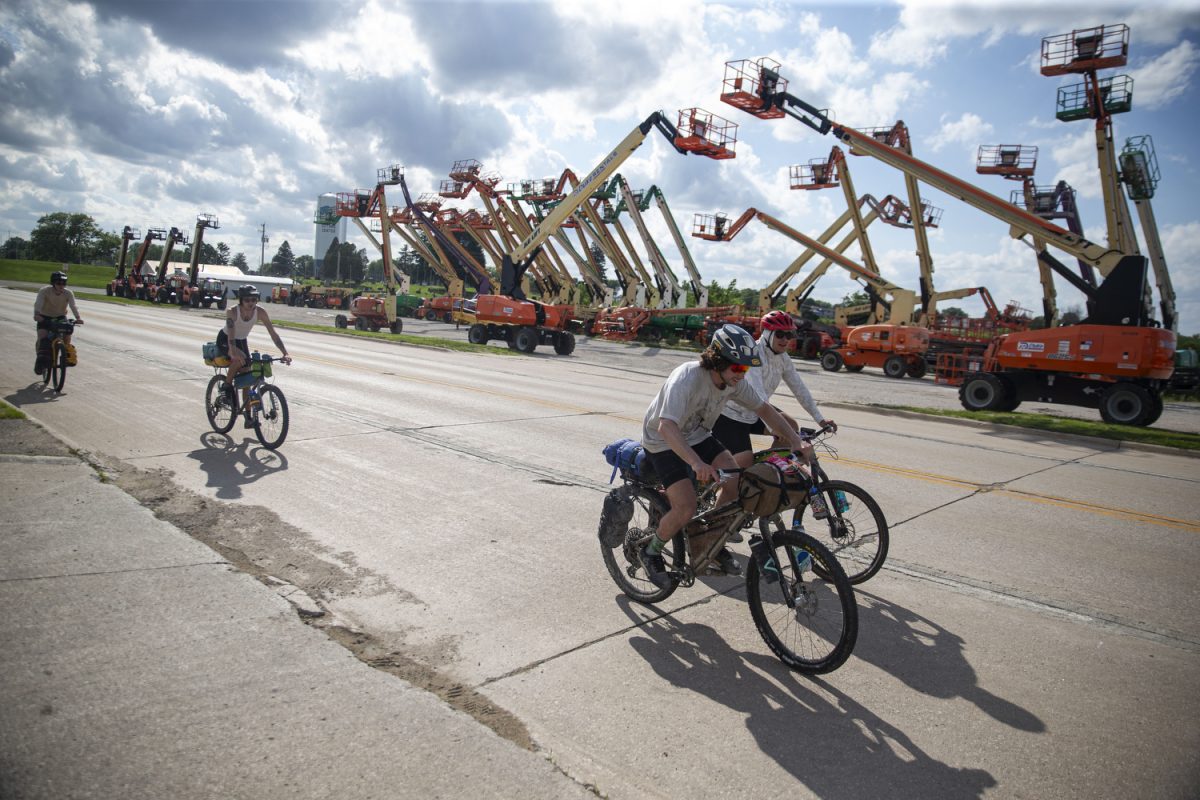Young workers in Iowa City successfully voted to unionize, putting Iowa on the map in the nationwide movement of collective organizing across Starbucks locations. The Clinton Street Starbucks near the University of Iowa campus became the first Starbucks to unionize in Iowa, and workers say conditions have already improved as a result.
Workers voted 25-0 in favor of unionizing this May because of issues with management. It was the largest unanimous union vote across Starbucks locations nationally.
Starbucks shift supervisor Abi Scheppmann said she had never been able to address problems with management in retail jobs before until she became part of a union.
“Usually you just kind of just have to shut up and take it,” she said. “But it’s really cool being able to have a collective voice and see, especially some of the younger baristas, experience standing up for themselves, knowing that they’ll go farther in life knowing that they can have a voice.”
Employees at the Clinton Street Starbucks say it was easy to build consensus because of their shared experiences working chaotic shifts.
“You really rely on each other [in] day-to-day operations,” Scheppmann said. “To be able to have a good shift you have to make sure you’re all working well together and it just makes you friends with each other.”
Scheppmann, a University of Iowa graduate, started working for the Starbucks Corporation in 2017 in Illinois and eventually transferred to the Clinton Street location.

“Within a few months, it became obvious at this location that it’s just hard to do the job the way we’re supposed to and the way we want to,” Scheppmann said. “It’s hard to serve the customers the way we want.”
Scheppmann said there are often issues with equipment, and before unionizing there was a broken tile on the floor where spoiled milk would fall and workers couldn’t clean.
“I think everyone realized that we’re in this for each other. And it became clear that Starbucks wasn’t looking out for us,” Scheppmann said. “We were looking out for each other, and unionizing was the best way to do that.”
Since unionizing, workers have held two one-day strikes. The first strike occurred in June because employees reportedly were not allowed to put up Pride month decorations, and the second strike occurred in August to protest a manager whom workers reported ongoing issues with.
Starbucks employee Luis Aispuro, who contacted Starbucks Workers United about unionizing, said the manager allegedly made comments that left employees uncomfortable, incorrectly placed supply orders that would cause the store to run out, and caused scheduling issues that contributed to a hostile environment.

Employees also reported to their district and regional manager they were required to stay open when there were biohazards, such as a nosebleed or vomit in the restaurant, and when there were shots fired at the nearby Ped Mall.
Since the recent strike, Clinton Street workers say the manager is no longer working with the company.
The second strike occurred on Aug. 21, the first day of UI classes. For many caffeine-dependent students, going to Starbucks is part of their morning routine or afternoon pick-me-up. When workers went on strike, some customers were disappointed, but Scheppmann said the reception was fairly positive.
Being in a college town, employees say the store will get mass influxes of students between class times. Scheppmann said she loves the rushes, but at certain points, the small capacity of the store and limited equipment can’t keep up.
“It is overwhelming at times and that’s what I’m hoping unionizing will help with, especially if we get a contract,” Scheppmann said.
The Clinton Street location is one of 356 Starbucks nationwide to successfully unionize. The first U.S. Starbucks to unionize was in Buffalo, New York, in December 2021. According to the educational nonprofit More Perfect Union, 449 Starbucks stores across 46 states have filed to unionize as of today.
Data visualization by Natalie Dunlap
Colin Kochran works as a barista at the Walden & Anderson Starbucks location in Cheektowaga, New York, one of the first Starbucks to file for unionization. Although the vote to unionize at his location was unsuccessful, he works with Starbucks Workers United as an organizer with stores that want to unionize in Nebraska, Texas, Oklahoma, Arkansas, Louisiana, and Iowa.
“It’s particularly valuable to have a store organized in a location where the union doesn’t already exist,” Kochran said.
Kochran said the goal of Starbucks Workers United is for every Starbucks worker to have power in their workplace.
Paul Iversen, an educator at the UI Labor Center, said before his work as an educator, he spent 22 years as a lawyer representing unions in Minnesota.
“The conventional wisdom before the Starbucks campaign was that it was impossible or at least very difficult to organize fast food restaurants — coffee shops like Starbucks — because there’s so much turnover in employees,” Iversen said.
In the U.S., over 11 percent of all workers are represented by unions. Among employees at food service and drinking places, almost 2 percent of workers are represented by unions as of 2022, according to the Bureau of Labor Statistics.
“The issue has been with an ever-changing workforce,” Iversen said. “What has happened since COVID-19, really, is there’s been a reexamination by workers across the country of what the employment relationship is going to be like, especially in food service industries.”
Data visualization by Natalie Dunlap
Evie Roberts worked at the Clinton Street location from May 2020 to July 2023. She said sometimes employees would have COVID-19 symptoms but not have a positive test, so management required them to come to work.
“We were being told that we were frontline workers and like, we serve coffee,” Roberts said. “We shouldn’t have to be risking our health because they want to make money.”
Iversen said Starbucks is an example of a resurgence in unions since the pandemic.
“There’s a little bit of learned helplessness where people thought that taking on these big corporations wasn’t working,” Iversen said. “Well, we’ve found again that the spirit of the American worker working together can affect change, and that has helped. So every victory helps another victory.”
After the Clinton Street Starbucks became the first, and so far, the only unionized location in Iowa, they collaborated with workers in Nebraska where one location was also working to become the first in their state.
August Adams is an employee at the 27th and Kensington Starbucks in Lincoln, Nebraska, which voted 18-1 in favor of unionizing on Aug. 7.
Adams reached out to Starbucks Workers United in January about unionizing and led the charge on unionizing in Lincoln.
“I’m immensely proud of the partners and my co-workers that I work with, for helping me organize the store and becoming the first unionized store in the state,” Adams said.
Data visualization by Natalie Dunlap
Although the downtown Starbucks was successful in unionizing with a unanimous vote and ousting the manager whom workers reported issues with, it has not been a frictionless effort across the nation.
“Starbucks has fought unionization very bitterly throughout the country and has been found guilty of a number of unfair labor practices: closing stores that unionized to firing people that tried to organize,” Iversen said.
Roberts, who recently moved from Iowa to Illinois, put in a transfer request and was offered a job as a Starbucks store manager in Wood Dale about a month before the Clinton Street Starbucks went on strike in July. Two days after the strike, Roberts said she got a call rescinding the offer, and the employers claimed there were allegedly no open positions in her area.
Starbucks also has yet to negotiate a new contract with Starbucks Workers United on a national scale and is instead trying to handle contracts on a location-specific basis.
Starbucks Workers United’s demands include just cause for discipline and discharge, grievance procedure, seniority rights, a base wage of $20 an hour, and employer-paid healthcare.
Employees at the unionized Iowa City Starbucks said they would still like to see movement on a contract, but they are proud of the progress they’ve made.
State Rep. Adam Zabner, D-Iowa City, joined Starbucks workers on the picket lines in August.
Zabner, 24, said he’s proud to have the first unionized Starbucks in Iowa in his district, and that the movement is driven by young people.
“Especially in an environment where Starbucks has been closing stores that have unionized [and] there’s been retaliation. To see that bravery and leadership from younger folks in our community, I just think it’s really really cool,” Zabner said.
As Starbucks reports record profits, Aispuro said he is proud to be part of the fight for the workers.
“We can barely pay rent. So I work hard, and where’s my cut?” Aispuro said. “Every job should be a union job. That’s how I feel about it.”
Iversen said the high-profile Starbucks Workers United campaign could inspire other workers.
“I think it’s helpful to other employees and other situations who say, ‘Look, if those baristas can do it in downtown Iowa City, you know, maybe we can do it.’”






